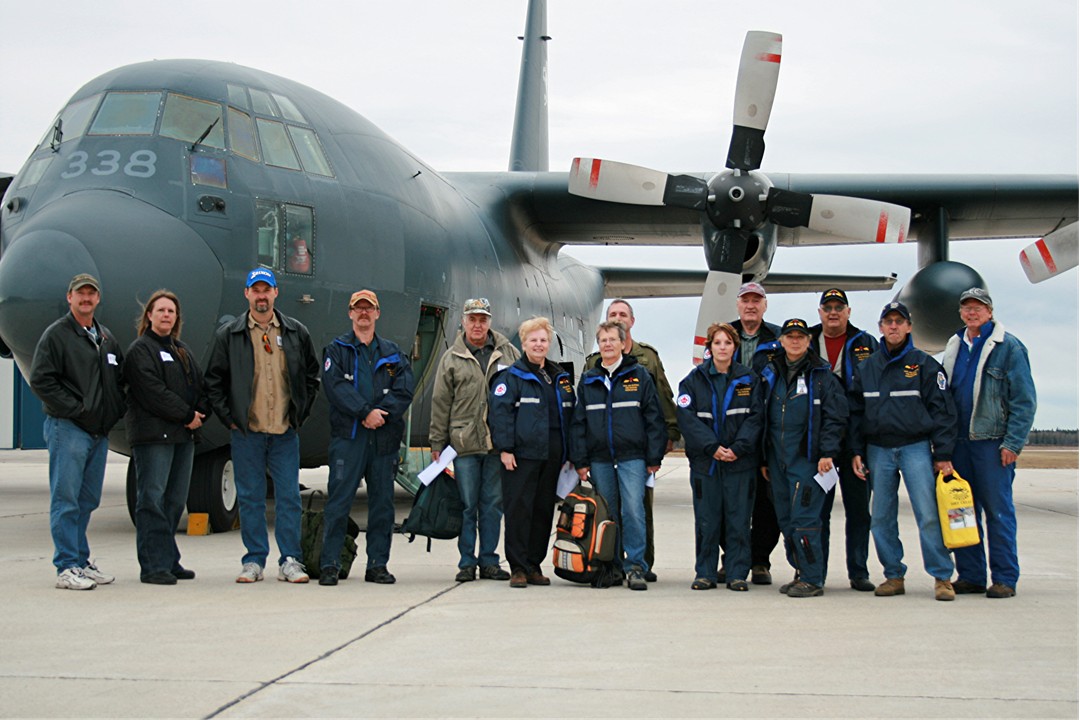Zone 3 Hercules Military Spotter Certification
200810

I’ve
been asked to do a written commentary on the Military Spotter Training that took
place in The Pas on October 18, 2008 from the perspective of a new member. Well,
I’m very new at this – joined less than a month ago. We’re talking scary nervous
new … and then I see this house with wings fly into The Pas Airport and think –
“What the ‘Hotel Echo Lima Lima’ have I gotten myself into??”
We were scheduled to meet the Flin Flon
members at the Hall at Clearwater Lake at 1630 Zulu time (how am I doing so
far?)… the Herc was scheduled to arrive at 1800 Zulu. There was a bit of a
delay, so we utilized the extra time to meet and greet, get to know each other,
watch a training video, practice the seat rotation procedures and get more and
more nervous (or maybe that was just me?).
Upon arrival, Captain Ben Toenders and SAR
Tech Dan Verret briefed us on the plane, the spotting techniques, techniques to
describe the target, safety information and other pertinent information (like
where the motion sickness bags were – very, very important!!). We did a quick
exercise to practice the description techniques and off we went to the plane.
The importance of the techniques hit home
thanks to SAR Tech Dan’s explanation of the process of a search and rescue
mission. So much so, that I go to sleep reciting – Direction of Turn, Clock
Position, Distance, Brief Description of Target, Big Picture of Target Location.
Now … to remember which side of the plane I’m on, which part of the clock is
“mine”, and just exactly how far is a mile? Holy smokes … I felt overwhelm mode
coming on quickly.
Once on the plane, we were given the location
of emergency exits, told how to use the seat belts (it looked easy!!), when and
when not to move around and all the other usual but mandatory pre-flight
information. Once we were all belted in, the noise began and we were off.
We were shown what it looks like to fly at
1500’, 1000’, and 500’ and given examples of distances at each of those
altitudes. (Whew – that solved the “how far is a mile” question.) We did our
training exercises at 1,000’. Captain Ben and SAR Tech Dan then picked out a
target and brought the plane around to it to give us a preview of what was
expected – both as far as spotting, descriptions, bringing the pilot to visual
AND just exactly how QUICKLY that house with wings can turn. Everyone seemed to
do fine as far as motion sickness went, but I definitely had me a few
questionable moments. Once I found my “sea” legs, it was manageable. Oh - for
information – according to Shelly, if you put a bandaid over your belly button,
it takes care of the problem of motion sickness. Hey – don’t knock it ‘til
you’ve tried it!!
SAR Tech Dan must have seen my panic-stricken
look of overwhelm, so he was kind and wrote the position of the clock on each
window. Yay – another question answered!! Really – it’s a lot to remember for a
newbie!!
We each took our turn in one of the spotter
seats. We were given a target and had to work our magic to bring the pilot to
visual. Everyone did a great job. As a rookie, I hung around and took pictures
while listening to everyone’s communications and learned something from
everyone, so by the time it came to my turn, I was a little less scared and
nervous and more determined to do my best. Some had more difficult targets and
had to bring the plane around more than once, but that’s all part of the process
and it’s great practice (although, not so great if you don’t have a band-aid on
your belly button!)
Once our turn in the spotter seat was done,
we were to spend some time in the cockpit to give us a better idea of what
things look like for the pilot, so we understand why the description techniques
are so important. Unfortunately, I was the last spotter, so when I was done, we
headed directly for home and wasn’t able to take advantage of any cockpit time.
Oh well – next time! And yes – I am definitely looking forward to a next time –
I want to try the band aid thing! No more scared and nervous. Now I just want to
learn as much as I can, practice and have it become second nature.
All in all, I think I can safely say on
behalf of everyone from Zone 3 that we had a very informative, enjoyable day and
we would like to thank those that made this training possible and who made it
happen. We would also like to thank Captain Ben and SAR Tech Dan and the rest of
the crew on the Herc for taking the time out of their busy schedules to allow us
this opportunity and for sharing their knowledge with us ... So Others May
Live!!
Smooth Flights and Safe Landings!!
Sue Doucette
Rookie
Zone 3, The Pas
20081021
Pictures submitted by
Sue Doucette
|